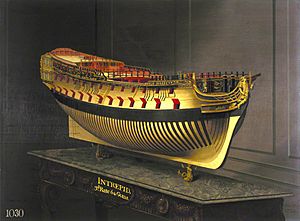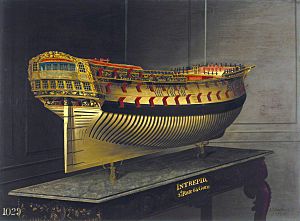HMS Intrepid (1770) facts for kids

HMS Intrepid's bow as painted in 1774 by Joseph Marshall
|
|
Quick facts for kids History |
|
|---|---|
| Name | HMS Intrepid |
| Ordered | 16 November 1765 |
| Builder | Woolwich Dockyard (M/Shipwright Joseph Harris to July 1767; completed by William Gray) |
| Laid down | January 1767 |
| Launched | 4 December 1770 |
| Fate | Sold out of the service, 1818 |
| Notes |
|
| General characteristics | |
| Class and type | Intrepid-class ship of the line |
| Tons burthen | 137465⁄94 |
| Length |
|
| Beam | 44 ft 5 in (13.5 m) |
| Depth of hold | 19 ft 0 in (5.8 m) |
| Propulsion | Sails |
| Sail plan | Full-rigged ship |
| Armament |
|
HMS Intrepid was a powerful 64-gun third-rate ship of the line in the Royal Navy. She was built at Woolwich and launched on December 4, 1770. This type of ship was a large warship designed to fight in a line of battle. Intrepid served the British Navy for many years before being sold in 1828.
Contents
Early Adventures of HMS Intrepid
In 1772, Intrepid set sail for the Dutch East Indies, a group of islands in Southeast Asia. On this long journey, the ship's master was John Hunter. He later became an important admiral and the second Governor of New South Wales in Australia.
Intrepid also took part in the famous Battle of the Chesapeake in 1781. This was a key naval battle during the American Revolutionary War.
Serving During the French Revolutionary Wars
During the French Revolutionary Wars, Intrepid was very active.
Capturing French Ships
In 1794, Intrepid and another British ship, Chichester, captured a French advice-brig named Serin near San Domingo. An "advice-brig" was a small, fast ship used for carrying messages. The British Navy then used Serin as one of their own ships.
In February 1796, Intrepid was on patrol near Cap-François. She was looking for British reinforcements when she spotted a French warship called a corvette. After chasing it for ten hours, the French corvette ran aground (got stuck on the shore) near Porto Plata. The French crew left their ship, and the British were able to take it. This ship was the French corvette Perçante. It had twenty 9-pounder guns and six smaller brass guns, with a crew of 200 men. The British Navy added it to their fleet as HMS Jamaica.
Voyage to China
Captain Sir William Hargood took command of Intrepid. He led a group of nine East Indiamen ships, which were large merchant ships, all the way to China. One of these ships was the Malabar.
Captain Hargood and Intrepid stayed in China until 1802. They helped protect Macau during an event called the Macau Incident in January 1799.
On April 4, 1801, Intrepid captured a ship named Chance.
HMS Intrepid in the Napoleonic Wars
In April 1809, a strong French fleet arrived at the Îles des Saintes, a group of islands south of Guadeloupe. British forces quickly surrounded them. On April 14, a British force, including Intrepid, invaded and captured the islands. Intrepid and other naval ships shared in the prize money from capturing the islands.
The Final Journey of HMS Intrepid
In May 1810, the Navy changed Intrepid into a "receiving ship." This meant she was used as a floating base where new sailors could live and be trained. After this, she was kept in "Ordinary" until 1815. "Ordinary" meant she was stored and not actively used.
On March 26, 1828, the British Navy decided to sell Intrepid. She was described as a 50-gun ship weighing 1374 tons. On that day, Intrepid was sold for £3,030 to a person named D. Beatson.
 | Aaron Henry |
 | T. R. M. Howard |
 | Jesse Jackson |


